Transvaginal Mesh Alternatives
- Last Updated: July 14th, 2025

Attorney Jessica Paluch-Hoerman, founder of TruLaw, has over 28 years of experience as a personal injury and mass tort attorney, and previously worked as an international tax attorney at Deloitte. Jessie collaborates with attorneys nationwide — enabling her to share reliable, up-to-date legal information with our readers.
Legally Reviewed
This article has been written and reviewed for legal accuracy and clarity by the team of writers and legal experts at TruLaw and is as accurate as possible. This content should not be taken as legal advice from an attorney. If you would like to learn more about our owner and experienced injury lawyer, Jessie Paluch, you can do so here.
Fact-Checked
TruLaw does everything possible to make sure the information in this article is up to date and accurate. If you need specific legal advice about your case, contact us by using the chat on the bottom of this page. This article should not be taken as advice from an attorney.
Key takeaways:
- Transvaginal mesh is a surgical tool used for treating stress urinary incontinence (SUI) and pelvic organ prolapse (POP), but it can have serious health risks.
- Alternatives to transvaginal mesh include pelvic floor therapy, medical treatments, and Kegel exercises which strengthen the muscles that support our organs.
- Natural tissue grafts and traditional surgeries are other options instead of using a transvaginal mesh implant.
- If you've had problems with a transvaginal mesh implant, legal help like TruLaw can assist you.
Overview of Transvaginal Mesh Alternatives
On this page, we’ll provide an overview of Transvaginal Mesh alternatives, risks and complications associated with Transvaginal Mesh implants, surgical and non-surgical Transvaginal Mesh alternatives, and much more.
There are several transvaginal mesh alternatives for the treatment of pelvic organ prolapse and stress urinary incontinence.
The alternatives to a transvaginal mesh implant include:
- Native tissue repair: This surgical treatment involves using the patient’s own tissue to repair the prolapse. It can be an effective alternative to mesh implants.
- Biological graft repair: This approach uses a graft from a source such as human or animal tissue to support the vaginal prolapse. It provides a natural alternative to synthetic mesh.
- Pubovaginal sling: This procedure utilizes the patient’s own tissue to create a sling that supports the bladder and urethra. It can be an effective alternative for stress urinary incontinence.

If you’ve experienced vaginal mesh complications, injuries, or adverse effects from a transvaginal mesh implant- you may be eligible to file for the Transvaginal Mesh Lawsuit.
Contact the experienced Transvaginal Mesh Attorneys at TruLaw today for a no-obligation consultation.
We’re here to help you seek the compensation you deserve.
Table of Contents
Transvaginal Mesh Alternatives
Native Tissue Repair
Native tissue repair is a surgical treatment that uses the patient’s own tissue to repair pelvic organ prolapse.
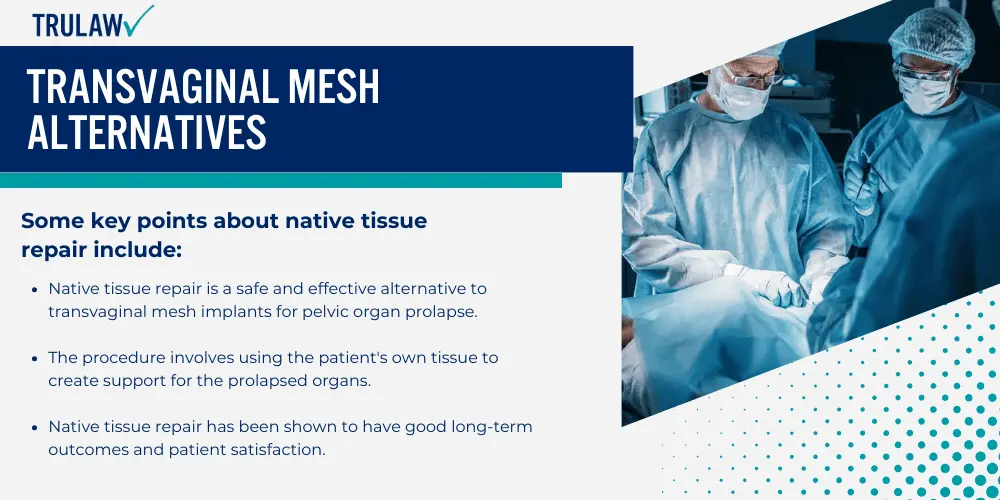
This approach avoids the use of synthetic mesh and can provide effective support for the prolapsed organs.
Some key points about native tissue repair include:
- Native tissue repair is a safe and effective alternative to transvaginal mesh implants for pelvic organ prolapse.
- The procedure involves using the patient’s own tissue to create support for the prolapsed organs.
- Native tissue repair has been shown to have good long-term outcomes and patient satisfaction.
Biological Graft Repair
Biological graft repair is another alternative to transvaginal mesh implants.
This approach involves using a graft from a source such as human or animal tissue to support the vaginal prolapse.
Some key points about biological graft repair include:
- Biological graft repair provides a natural alternative to synthetic mesh for pelvic organ prolapse.
- The graft is used to provide support and reinforcement to the weakened vaginal tissues.
- Biological graft repair has been shown to have good success rates and low complication rates.
Pubovaginal Sling
Pubovaginal sling is a surgical procedure that uses the patient’s own tissue to create a sling that supports the bladder and urethra.
It can be an effective alternative for stress urinary incontinence.
Some key points about pubovaginal sling include:
- Pubovaginal sling is a safe and effective alternative to transvaginal mesh implants for stress urinary incontinence.
- The procedure involves using the patient’s own tissue to create a sling that supports the bladder and urethra.
- Pubovaginal sling has been shown to have high success rates in treating stress urinary incontinence.
In conclusion, there are several alternatives to transvaginal mesh implants for the treatment of pelvic organ prolapse and stress urinary incontinence.
These alternatives include native tissue repair, biological graft repair, and pubovaginal sling.
Transvaginal Mesh Alternatives
Transvaginal mesh is a medical device designed to support weakened pelvic tissues.
Predominantly made from Type I monofilament, large-pore polypropylene mesh, this urogynecological tool serves the purpose of treating specific conditions such as stress urinary incontinence and pelvic organ prolapse.
It is surgically implanted into the pelvic region providing reinforcement and stability.
The utilization of transvaginal mesh became a widely adopted practice owing to its lower rates of prolapse awareness, repeat surgery, and protrusion upon examination.
However, it’s crucial for women to understand that transvaginal mesh isn’t synonymous with laparoscopic procedures or mesh slings.
Each carries separate implications and uses tailored to address distinct medical conditions.
Unfortunately, it can lead to severe complications impacting a woman’s physical and emotional health.
Non-surgical practices such as pelvic floor therapy, medications, and strength-building exercises like Kegels serve as viable alternatives.
There are also different surgical approaches that do not involve the transvaginal mesh, but instead use traditional surgeries or natural tissue grafts.

Manufacturers have come under heavy scrutiny for producing this harmful device and numerous lawsuits have been filed against them, leading to settlements in favor of the victims.
New technological advances have given rise to other alternatives such as Transobturator tape (TOT), tension-free transvaginal tape (TVT), and adjustable slings which are gaining popularity among medical professionals for treating SUI & POP.
When is Transvaginal Mesh Used?
Transvaginal mesh is primarily used in treating conditions such as Stress Urinary Incontinence (SUI) and Pelvic Organ Prolapse (POP), this involves a surgical procedure that provides support to weakened pelvic organs.
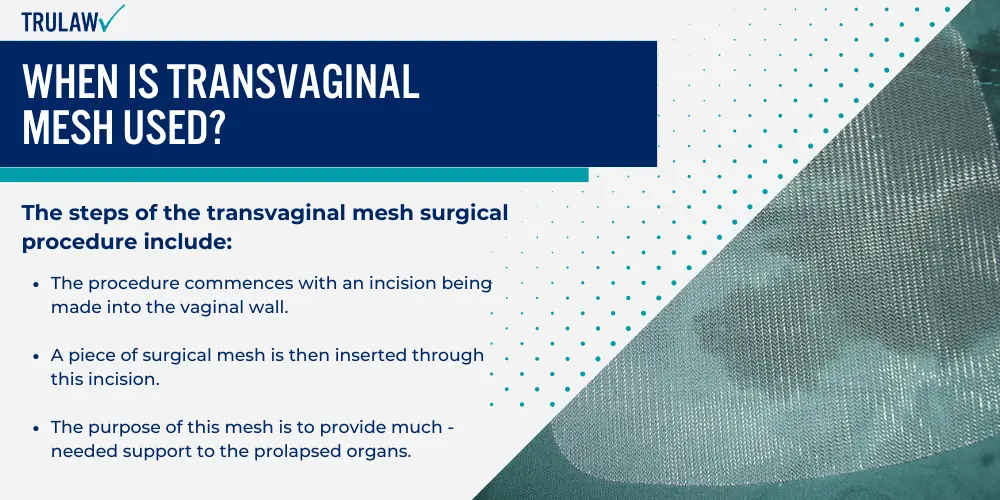
Dive deeper into the usage, effectiveness, and potential risks of transvaginal mesh in the following sections.
Explanation of the conditions it is used for (SUI and POP)
Surgeons commonly use transvaginal mesh to treat two specific conditions: Stress urinary incontinence (SUI) and pelvic organ prolapse (POP). SUI is a medical condition where pressure on the bladder leads to involuntary leakage of urine.
Activities such as sneezing, laughing, lifting heavy objects or exercise can trigger this. Women often experience it due to weakened pelvic muscles following childbirth, with age being another significant risk factor.
On the other hand, POP happens when one or more of the pelvic organs slip down from their regular position and protrude into the vagina due to loss of support from surrounding muscles and tissues.
This causes discomfort and complications like constipation or difficulties during intercourse.
Procedures that involve implanting a surgical mesh through the vaginal wall provide reinforcement for weakened structures are typically performed when non-surgical treatments fail to address these issues effectively.
Transvaginal Mesh Surgical Procedure
Transvaginal mesh surgery is a treatment option for women suffering from conditions like stress urinary incontinence and pelvic organ prolapse.
The steps of the transvaginal mesh surgical procedure include:
- The procedure commences with an incision being made into the vaginal wall.
- A piece of surgical mesh is then inserted through this incision.
- The purpose of this mesh is to provide much – needed support to the prolapsed organs.
- Transvaginal permanent mesh, one type in use, has shown lower rates of prolapse awareness and repeat surgeries that are required.
- While effective, such surgery is usually considered only after non – surgical treatments fail to offer relief.
Risks and Complications Associated with Transvaginal Mesh Implants
Transvaginal mesh implants can lead to various physical and emotional complications such as infection, bleeding, pain during intercourse and even organ perforation; these issues emphasize the importance of being informed before choosing a course of action.
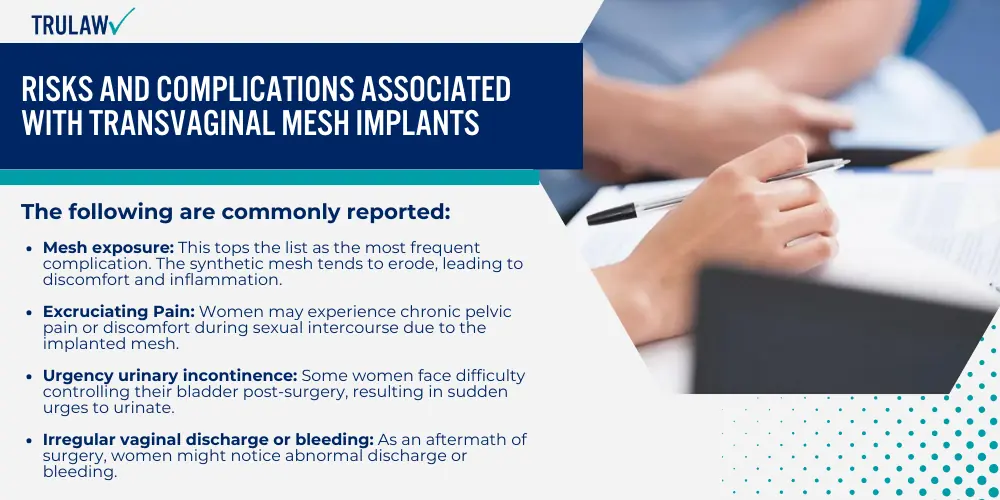
Dive deeper into this matter to learn more about potential risks and find safer alternatives for you.
Transvaginal Mesh Implants: Common Complications
While transvaginal mesh can successfully treat pelvic organ prolapse and stress urinary incontinence, it is often associated with a host of complications and side effects.
The following are commonly reported:
- Mesh exposure: This tops the list as the most frequent complication. The synthetic mesh tends to erode, leading to discomfort and inflammation.
- Excruciating Pain: Women may experience chronic pelvic pain or discomfort during sexual intercourse due to the implanted mesh.
- Urgency urinary incontinence: Some women face difficulty controlling their bladder post-surgery, resulting in sudden urges to urinate.
- Irregular vaginal discharge or bleeding: As an aftermath of surgery, women might notice abnormal discharge or bleeding.
- Pelvic swelling: Swelling around the pelvic region is another common complaint after transvaginal mesh implantation.
- Infection: Surgical procedures always carry a risk of infection, and implantation of surgical mesh is no different.
- Nerve damage: In some cases, nerves may be harmed during the procedure causing neuro-muscular problems.
- Organ perforation and tearing: Rare but serious complications include damages to nearby organs such as the bladder, bowel or uterus due to mesh erosion.
The impact on physical and emotional well-being
The physical toll of transvaginal mesh complications can be significant, leading to persistent pain and discomfort.
This chronic pain may arise from poor tissue integration or the formation of additional scar tissue around the surgical site.
It’s common for women who experience these complications not only to face physical challenges, but also suffer emotionally.
Additionally, emotional distress often accompanies these health concerns as they interfere with a woman’s daily life quality.
Constantly dealing with unexpected health problems may lead to feelings of frustration and hopelessness over time which can then evolve into anxiety or depression.
Thus, understanding the potential impact on both physical and emotional well-being is crucial when considering transvaginal mesh implants.
Non-Surgical Alternatives to Transvaginal Mesh
Exploring non-surgical alternatives to transvaginal mesh, we delve into effective methods such as pelvic floor therapy, lifestyle modifications, and prescribed medications that have been successful in treating conditions like Stress Urinary Incontinence (SUI) and Pelvic Organ Prolapse (POP).
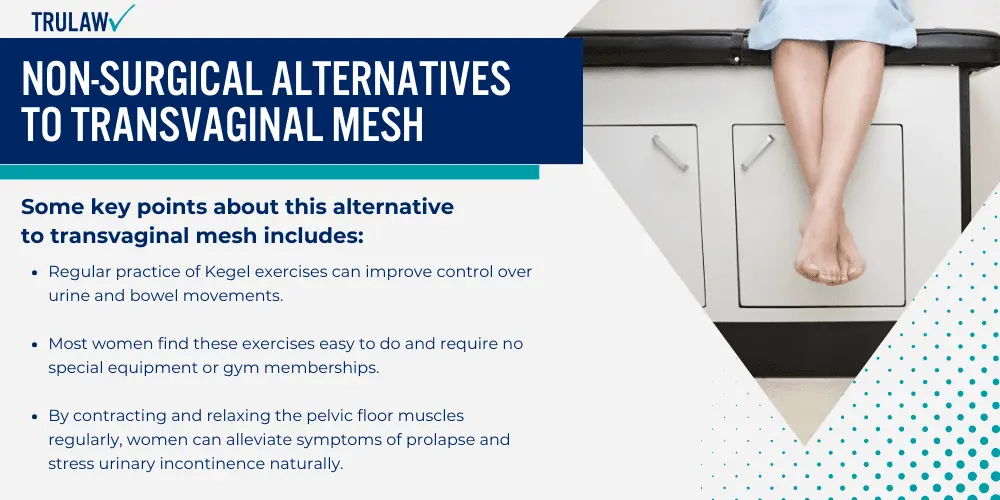
Pelvic floor therapy
Pelvic floor therapy stands out as an effective non-surgical alternative to transvaginal mesh.
As part of this therapeutic approach, physical therapy is employed to strengthen pelvic floor muscles and alleviate symptoms of stress urinary incontinence and pelvic organ prolapse.
Unlike surgical implantation of transvaginal mesh, which could potentially lead to complications such as mesh erosion and scar tissue formation, the practice of pelvic floor therapy prioritizes patient comfort and safety.
Moreover, this treatment option offers significant benefits, including lower rates of condition recurrence compared to traditional native tissue repair procedures.
Medications
Several prescription medications prove beneficial in the management of stress urinary incontinence and pelvic organ prolapse.
For instance, anticholinergic drugs or alpha-adrenergic agonists are viable options for women experiencing mild symptoms.
These medicines work by relaxing bladder muscles to control involuntary urine leakage.
Some hormones, mainly topical estrogen therapy, can strengthen your vaginal tissues if you’re postmenopausal.
The hormone treatment improves urinary incontinence by replenishing estrogen levels in the body, thus improving overall health of the pelvic floor muscles.
However, always discuss side effects and potential risks with your healthcare provider before starting any new medication regimen.
Kegel exercises
Kegel exercises have emerged as a simple yet effective alternative to transvaginal mesh implants for treating pelvic organ prolapse and stress urinary incontinence.
These exercises aim to strengthen the pelvic floor muscles that support bladder, uterus, rectum and small intestine.
Some key points about this alternative to transvaginal mesh includes:
- Regular practice of Kegel exercises can improve control over urine and bowel movements.
- Most women find these exercises easy to do and require no special equipment or gym memberships.
- By contracting and relaxing the pelvic floor muscles regularly, women can alleviate symptoms of prolapse and stress urinary incontinence naturally.
- Kegel exercises are also beneficial post childbirth as they help tighten weakened vaginal muscles.
Surgical Alternatives to Transvaginal Mesh Implants
This section delves into surgical substitutes for transvaginal mesh implants, with a focus on conventional stress urinary incontinence (SUI) and pelvic organ prolapse surgery.
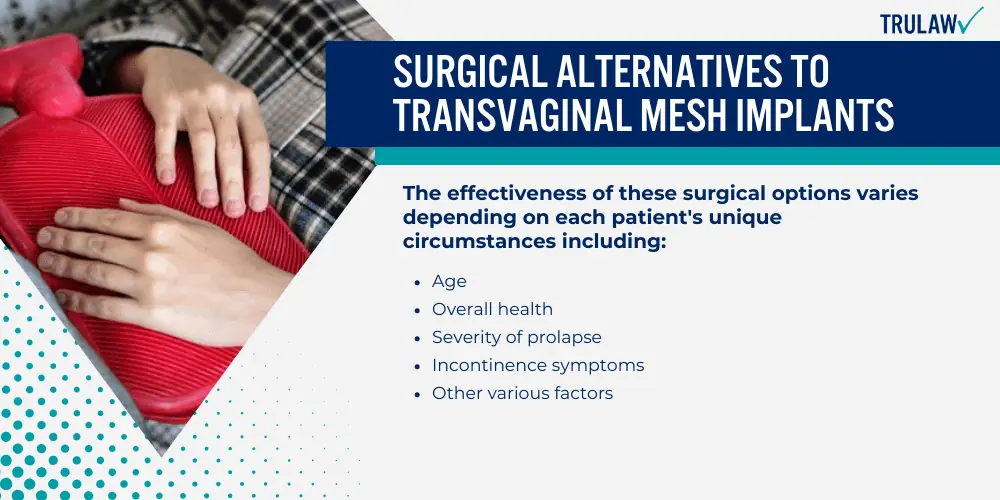
The use of natural tissue grafts as an alternative is also discussed, highlighting the pros, cons and potential outcomes of these procedures.
Traditional SUI and POP surgeries
In traditional surgeries for SUI (Stress Urinary Incontinence) and POP (Pelvic Organ Prolapse), no mesh is used, which serves as an alternative to transvaginal mesh implants.
The procedures involve repairing or reconstructing the natural tissues that hold the pelvic organs in place.
Surgeons utilize stitches to strengthen the weakened muscles and ligaments, facilitating adequate support for pelvic organs like bladder, rectum, and uterus.
While abdominal POP surgery seems to present lower rates of complications compared to its transvaginal counterpart when using a mesh implant, it’s crucial to note that traditional operations without meshes still remain a viable option.
The effectiveness of these surgical options varies depending on each patient’s unique circumstances including:
- Age
- Overall health
- Severity of prolapse
- Incontinence symptoms
- Other various factors
The use of natural tissue grafts
Natural tissue grafts serve as a notable alternative to transvaginal mesh implants. Surgeons often utilize the patient’s own tissues or biological material during prolapse surgery, enhancing the outcomes of these procedures.
This surgical option involves using durable materials that are compatible with the human body and can provide similar support and function without some of the risks associated with synthetic meshes.
The benefits of natural tissue grafts extend beyond their compatibility.
These grafts also contribute significantly to reducing complications associated with pelvic floor surgeries.
By harnessing native tissue repair techniques, medical professionals can manage issues such as scar tissue formation or erosion more effectively than when dealing with synthetic implant materials.
While this approach may require careful consideration and skilled surgery, for many women it offers a viable and safer version of treatment for pelvic organ prolapse.
Other Alternatives to Vaginal Mesh Implants
Exploring other alternatives to vaginal mesh implants such as transobturator tape, tension-free transvaginal tape, and adjustable slings can provide safer solutions to urinary incontinence and pelvic organ prolapse without the risks associated with mesh use.
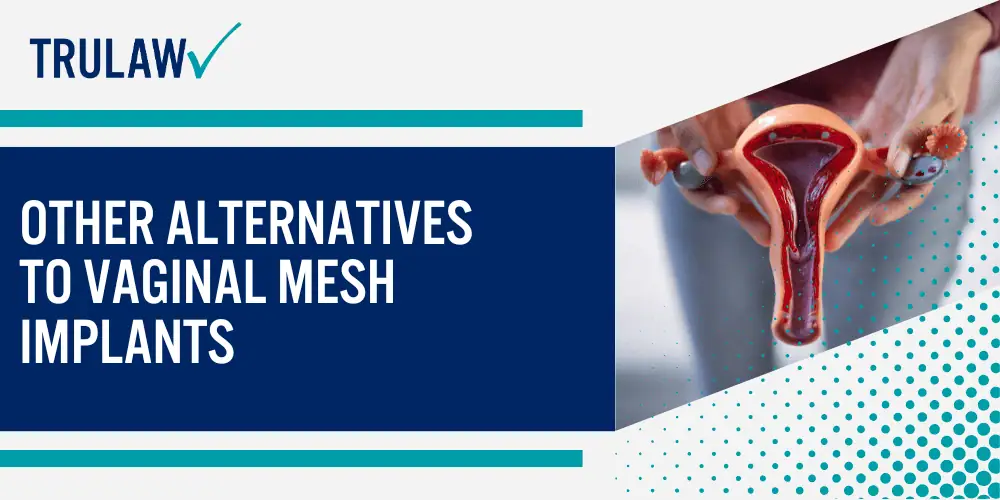
Transobturator tape
Surgeons often turn to the use of transobturator tape as an alternative for vaginal mesh implants in cases of stress urinary incontinence or pelvic organ prolapse.
This surgical option offers relief when non-surgical treatments fail to generate satisfactory results.
The procedure involves careful placement of a specially designed tape through the obturator foramen, creating a support system for the urethra and bladder neck.
Just like any other surgery, it also carries potential risks that patients should consider before opting for this treatment.
In certain situations when complications arose from using mesh implants, total removal of transobturator tape has successfully resolved these issues.
However, always consult with your healthcare provider to discuss the best solution tailored to your specific medical condition.
Tension-free transvaginal tape
Tension-free transvaginal tape, often referred to as TVT, has emerged as a reliable surgical alternative to transvaginal mesh for women suffering from stress urinary incontinence.
This revolutionary technique offers significant benefits with high satisfaction rates and confirmed safety over long-term use.
Many studies have shown that TVT can help resolve symptoms of bladder control problems effectively and efficiently among many women.
It is also noteworthy that the chances of experiencing pain post this procedure are quite low, making it an acceptable choice for patients concerned about comfort and quality of life after surgery.
Readjustable sling
A readjustable sling offers an innovative solution for pelvic floor reconstructive surgery.
This state-of-the-art device functions as a versatile alternative to traditional transvaginal mesh implants.
Conceived with flexibility in mind, the design enables doctors to make adjustments according to each patient’s unique needs.
Success rates have shown significant improvement with the use of adjustable slings in second-line surgical management after midurethral procedures.
Moreover, this method has demonstrated fewer complications compared to other options, providing patients not only with effective treatment but also peace of mind knowing they are less likely to experience potential issues associated with other surgical interventions.
Leveraging this modern approach could serve as a turning point in managing conditions such as stress urinary incontinence and pelvic organ prolapse.
Manufacturers and Brands of Transvaginal Mesh Implants
There are several manufacturers and brands that produce transvaginal mesh implants, including Johnson & Johnson, Boston Scientific, and Bard Medical.
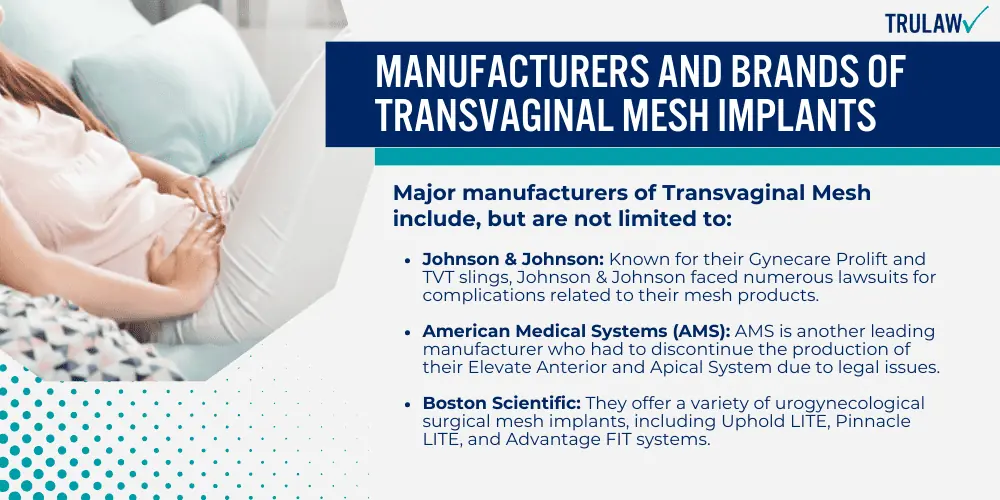
Recent years have seen a surge in lawsuits against these companies due to severe complications caused by their products.
Explanation of the various manufacturers and brands
Several manufacturers produce different types of transvaginal mesh.
Each brand has its own design, purpose, and specifications.
Major manufacturers of Transvaginal Mesh include:
- Johnson & Johnson: Known for their Gynecare Prolift and TVT slings, Johnson & Johnson faced numerous lawsuits for complications related to their mesh products.
- American Medical Systems (AMS): AMS is another leading manufacturer who had to discontinue the production of their Elevate Anterior and Apical System due to legal issues.
- Boston Scientific: They offer a variety of urogynecological surgical mesh implants, including Uphold LITE, Pinnacle LITE, and Advantage FIT systems.
- Coloplast: Known for their Novasilk Synthetic Mesh system and Aris Transobturator Sling system.
- Bard Medical: Marsupial, Align, Avaulta Solo are some of the brands developed by Bard Medical.
Mention of recent lawsuits against these companies
Major manufacturers of transvaginal mesh like Johnson & Johnson, Boston Scientific, and C.R. Bard find themselves in legal hot water as an influx of lawsuits surface.
Women treated with their products have been reporting severe complications, leading to life-altering conditions.
In light of these disturbing revelations, thousands of affected patients are resorting to the courts for justice.
Since 2012 alone, at least 20 verdicts have gone in favor of these women, tallying an estimated sum of $300 million in damages awarded.
The misconduct allegations brought against these companies range extensively from issues relating to product safety down to their marketing practices.
Transvaginal Mesh Lawsuits
There is significant legal action being pursued against manufacturers of transvaginal mesh due to the serious complications many women have experienced.

At TruLaw, we’re dedicated to helping those affected navigate these complex lawsuits and seek the justice they deserve.
Legal Action Taken Against Manufacturers
Several transvaginal mesh manufacturers are currently facing legal actions for their products.
These lawsuits are primarily based on allegations that the companies failed to warn patients and doctors about potential complications related to mesh implants.
In recent years, thousands of legal claims have been resolved favorably for the plaintiffs, with settlements surpassing $8 billion in total.
The main contention is that these devices were marketed without adequate safety testing or alerting users to possible severe side effects such as pain, infection, bleeding and perforation of organs.
TruLaw Can Help
TruLaw extends a helping hand to those negatively impacted by transvaginal mesh implants.
If you’ve experienced vaginal mesh complications, injuries, or adverse effects from a transvaginal mesh implant- you may be eligible to file for the Transvaginal Mesh Lawsuit.
This legal aid includes individuals who’ve suffered complications such as infections, chronic pain, or recurrence of incontinence after surgery.
Contact the experienced Transvaginal Mesh Attorneys at TruLaw today for a no-obligation consultation.
We’re here to help you seek the compensation you deserve.
Conclusion and Call to Action
Exploring alternatives to transvaginal mesh opens up a range of potential solutions that may better suit individual needs and scenarios.
Various Alternatives to Transvaginal Mesh
Nonsurgical actions can involve pelvic floor therapy, medications and regular Kegel exercises – all aimed at strengthening the pelvic muscles.
For those considering surgery, traditional SUI (stress urinary incontinence) and POP (pelvic organ prolapse) operations present an option, as does the use of natural tissue grafts for repair.
Other medical aids such as tension-free vaginal tape or a readjustable sling offer less invasive alternatives for treatment while reducing associated risks and complications.
Transvaginal Mesh Lawsuit Frequently Asked Questions
-
Individuals may seek alternatives to these devices for the treatment of pelvic organ prolapse (POP) and stress urinary incontinence (SUI).
Here are some of the most common surgical and non-surgical Transvaginal Mesh alternatives available to women:
Surgical treatments (other than mesh):
- Native tissue repair: This procedure involves using the patient’s own tissue to repair the prolapse.
- Biological graft repair: In this approach, a graft from a source such as human or animal tissue is used to support the vaginal prolapse.
- Pubovaginal sling: This technique utilizes the patient’s own tissue to create a sling that supports the bladder and urethra.
Non-surgical options:
- Pelvic floor therapy: Physical therapy exercises that strengthen the pelvic muscles can help alleviate mild symptoms of SUI or POP.
- Vaginal pessary: A pessary is a removable device inserted into the vagina to provide support for the pelvic organs.
It is important to consult with a healthcare professional to determine the most suitable alternative treatment option based on individual circumstances.
-
Yes, there are other materials used as Transvaginal Mesh alternatives to synthetic meshes used in surgeries.
Some of these alternatives include:
- Tension or tension-free repair methods using sutures: Instead of using a synthetic mesh, surgeons can use sutures to connect damaged tissue. This technique may take less surgical time but may require longer recovery times.
- Biologic meshes: Biologic meshes are made from natural materials, such as animal or human tissue. These meshes are designed to be absorbed by the body over time. They can provide support during the healing process and reduce the risk of complications associated with synthetic meshes.
- Hybrid meshes: Hybrid meshes are a combination of synthetic and biologic materials. These meshes aim to provide the benefits of both types of materials, such as strength and biocompatibility. One example of a hybrid mesh is TELA Bio’s Ovitex, which has a permanent scaffold made from biologic material.
It’s important to note that the choice of mesh material depends on various factors, including the specific surgical procedure, the patient’s condition, and the surgeon’s preference.
-
Yes, Pelvic organ prolapse (POP) can be treated without surgery using non-surgical methods such as the use of a vaginal pessary.
Vaginal Pessary
A vaginal pessary is a removable device made of rubber or silicone that is placed into the vagina to hold prolapsed organs in place.
Some key benefits of using Transvaginal Mesh alternatives such as a vaginal pessary include:
- Provides support for prolapsed organs
- Alleviates symptoms of pelvic organ prolapse
- Non-invasive and reversible treatment option
Using a vaginal pessary can be an effective alternative to surgery for managing pelvic organ prolapse and is frequently recommended for use in women experiencing mild-to-moderate prolapse.
-
Physical therapy and pelvic floor exercises are non-invasive approaches that aim to strengthen the pelvic floor muscles and improve symptoms of pelvic organ prolapse.
Physical Therapy and Pelvic Floor Exercises
These interventions may be effective for some individuals, particularly those with mild to moderate prolapse.
Some key takeaways from these Transvaginal Mesh alternatives include:
- Physical therapy and pelvic floor exercises can help improve muscle tone and provide support to the pelvic organs.
- These interventions may reduce symptoms such as urinary incontinence and pelvic pressure.
- It is important to consult with a healthcare professional or pelvic floor specialist to determine the most appropriate exercises and treatment plan for individual needs.
However, the effectiveness may vary depending on the severity of the prolapse and individual factors.
-
Transvaginal mesh removal is performed by a urogynecologist.
Complete removal of the mesh is possible for some women, while in other cases, only part of the mesh can be removed due to complicated issues related to the type of mesh used.
Mesh removal may require the rebuilding of the abdominal wall and can be performed by a general surgeon or in collaboration with a plastic surgeon.
The procedure aims to remove the mesh implant and, if necessary, repair any damage or complications caused by the mesh.

Managing Attorney & Owner
With over 25 years of legal experience, Jessica Paluch-Hoerman is an Illinois lawyer, a CPA, and a mother of three. She spent the first decade of her career working as an international tax attorney at Deloitte.
In 2009, Jessie co-founded her own law firm with her husband – which has scaled to over 30 employees since its conception.
In 2016, Jessie founded TruLaw, which allows her to collaborate with attorneys and legal experts across the United States on a daily basis. This hypervaluable network of experts is what enables her to share the most reliable, accurate, and up-to-date legal information with our readers!
Additional Transvaginal Mesh Lawsuit resources on our website:
Here, at TruLaw, we’re committed to helping victims get the justice they deserve.
Alongside our partner law firms, we have successfully collected over $3 Billion in verdicts and settlements on behalf of injured individuals.
Would you like our help?
At TruLaw, we fiercely combat corporations that endanger individuals’ well-being. If you’ve suffered injuries and believe these well-funded entities should be held accountable, we’re here for you.
With TruLaw, you gain access to successful and seasoned lawyers who maximize your chances of success. Our lawyers invest in you—they do not receive a dime until your lawsuit reaches a successful resolution!
AFFF Lawsuit claims are being filed against manufacturers of aqueous film-forming foam (AFFF), commonly used in firefighting.
Claims allege that companies such as 3M, DuPont, and Tyco Fire Products failed to adequately warn users about the potential dangers of AFFF exposure — including increased risks of various cancers and diseases.
Depo Provera Lawsuit claims are being filed by individuals who allege they developed meningioma (a type of brain tumor) after receiving Depo-Provera birth control injections.
A 2024 study found that women using Depo-Provera for at least 1 year are five times more likely to develop meningioma brain tumors compared to those not using the drug.
Suboxone Tooth Decay Lawsuit claims are being filed against Indivior, the manufacturer of Suboxone, a medication used to treat opioid addiction.
Claims allege that Indivior failed to adequately warn users about the potential dangers of severe tooth decay and dental injuries associated with Suboxone’s sublingual film version.
Social Media Harm Lawsuits are being filed against social media companies for allegedly causing mental health issues in children and teens.
Claims allege that companies like Meta, Google, ByteDance, and Snap designed addictive platforms that led to anxiety, depression, and other mental health issues without adequately warning users or parents.
Transvaginal Mesh Lawsuits are being filed against manufacturers of transvaginal mesh products used to treat pelvic organ prolapse (POP) and stress urinary incontinence (SUI).
Claims allege that companies like Ethicon, C.R. Bard, and Boston Scientific failed to adequately warn about potential dangers — including erosion, pain, and infection.
Bair Hugger Warming Blanket Lawsuits involve claims against 3M — alleging their surgical warming blankets caused severe infections and complications (particularly in hip and knee replacement surgeries).
Plaintiffs claim 3M failed to warn about potential risks — despite knowing about increased risk of deep joint infections since 2011.
Baby Formula NEC Lawsuit claims are being filed against manufacturers of cow’s milk-based baby formula products.
Claims allege that companies like Abbott Laboratories (Similac) and Mead Johnson & Company (Enfamil) failed to warn about the increased risk of necrotizing enterocolitis (NEC) in premature infants.
Here, at TruLaw, we’re committed to helping victims get the justice they deserve.
Alongside our partner law firms, we have successfully collected over $3 Billion in verdicts and settlements on behalf of injured individuals.
Would you like our help?
